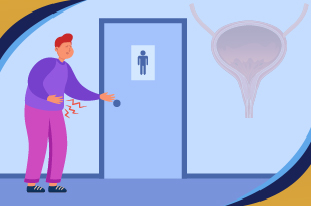Anxiety is a commonly experienced mental health condition that impacts the lives of several people around the globe. However, many people are aware of the signs of anxiety such as the common ones like racing heartbeat, sudden thoughts, and extreme worry. However, the signs are much more than that, and anxiety tics are one of them. Anxiety tics are physical movements that occur involuntarily. Many of you might be wondering, “Are anxiety tics a thing?” And “Can anxiety cause tics?” The simple answer is yes, these occur basically as a response to certain stressors and sometimes anxiety disorders. Some of the common anxiety tics symptoms are eye blinking, head jerking, and vocal tics. To attain more knowledge on anxiety tics, continue reading this blog.
What Are Anxiety Tics?
Anxiety tics are sudden, spontaneous vocalizations that are led due to the anxiety episodes a person experiences. These are not always preventable, but various effective strategies can be the source to promote peace and relaxation from the signs of anxiety tics in a person. Moreover, certain tics include motor movement, thus known as motor tics. Similarly, vocal tics include certain sounds and words. Now, tics can vary from person to person. They impact any area of the body of the sufferer such as the face, neck, shoulder, arms, and hands as well.
Some of the common anxiety tics examples are constant blinking of eyes, jerking of the head, and persistent lip twitching. Coughing, mumbling, and throat clearing are some of the common vocal tics.
Read More: A Guide to Understand Anxious Attachment
Can Tics Be Caused By Anxiety?
Many people desire to learn about a common query “Does anxiety cause tics?”. The answer to this question is no. There can be several other reasons as well leading to manifestation of tics. Moreover, tics are not considered a formal sign of anxiety and are not a part of the diagnostic criteria for anxiety disorders.
Anxiety tics shiver usually happen due to the body being responsive to external stress. Some research shows anxious tics are linked with imbalances in the dopamine signaling (2) in the basal ganglia (a brain part composed of interconnected clusters of nerve cells). An interesting fact is that basal ganglia is seen to be involved in motor control and stress response as well. Moreover, if anxiety tics are left untreated they can lead to depression and Major Depressive Disorder.
What Are The Common Triggers Of Anxiety Tics?
Anxiety itself is seen to be the primary trigger (3) of anxiety tics. The more anxious you feel, the more extreme your tics will be. Triggers for anxiety tics are personal and include any situations you consider stressful such as:
- Demanding job
- Losing a loved one or any personal loss
- Experiencing chronic fatigue
- Extreme Illness
- Stressful social situations
- Crucial life transitions
There is no valid research done on the link between diet and anxiety tics. However, some researchers (1). suggest that some foods such as caffeine and refined sugar can lead to Tourette syndrome.

As per the meta-analysis done in 2022, the results showed that caffeine intake of at least 5 cups daily can intensify the feelings of anxiety as well as the occurrence rate of panic attacks. If you experience anxiety tics, the chances might be they are due to caffeine intake.
What Is The Difference Between Anxiety Tics And Functional Tic-Like Behavior?
Anxiety induced tics are not similar to functional tic-like behavior. The latter comprises sudden vocal and motor tics that may take over the sufferer’s body for days or hours. Furthermore, they don’t appear to be derived from a neurological reason.
Meanwhile, both categories include heightened anxiety(1), and tics linked with anxiety are seen to develop directly from the physiological changes in the stressed response. On the other hand, functional tic-like behavior appears to be a part of broader experience with psychological distress, and other signs.
Read More: Can Anxiety Disorder Cause High Blood Pressure? Insights About The Connection
What Is The Duration Of Anxiety Tics After Manifestation?
The duration of anxiety-associated tic episodes is in the range of seconds to minutes(1). During times of elevated anxiety or acute stress, however, tic signs are seen to occur back to back or in a repeated pattern. If you don’t reach out to some mental health professional for anxiety management techniques, you may suffer from tics throughout your life.
Do Anxiety Tics Go Away On Their Own?
Usually, anxiety tics are seen to be common when a person is in their childhood or adolescent phase. For some sufferers, these tics vanish when they reach adulthood as they become aware of stress management techniques for handling their anxiety. However, this is the case for every sufferer. For some, the tics can continue even in their adulthood as well. The intensity increases if the tics are not treated on time with the help of professional therapeutic approaches and some lifestyle changes.
How To Stop Anxiety Tics?
We cannot deny the fact that anxiety tics can be challenging but the good news is that you can noticeably reduce the occurrence rate and the linked adverse impact by following certain simple tips such as:
-
Peaceful workspace:
The best way to reduce the manifestation of tic anxiety is to build a calming environment around you. The aim is to minimize the occurrence of anxiety tics. What you can do in this regard is to make sure that your workspaces and homes(2). are clean and tidy, free of any clutter, and most importantly you feel comfortable in it. However, this can be hard for people suffering from ADHD and anxiety tics simultaneously.
-
Practicing relaxation techniques:
Trying to learn relaxation techniques such as deep breathing exercises, progressive muscle relaxation, and even meditation can work wonders in reducing the signs of anxiety tics. Moreover, these practices have been shown to minimize the signs of anxiety disorders. Researches also show that relaxation techniques are helpful in reducing the signs of mood disorder as well by promoting a good mood.
Read More: There’s Something About Disruptive Mood Dysregulation Disorder That You Should Know (DMDD)
-
Look for professional assistance:
If you are suffering from difficulty linked with anxiety such as extreme tics, transient tic disorder, or even OCD, then consider seeking help through anxiety therapies. These therapies are implemented by mental health experts. The common ones are psychotherapy such as cognitive behavioral therapy (CBT).
-
Medication management:
There are certain medications that can be helpful in managing the signs of anxiety tics such as selective serotonin reuptake inhibitors (SSRIs) and several other anxiety medications like benzodiazepines(3). You can work with your healthcare expert to identify which medicine works best for you. If proper medication is not consumed it can enhance the chances of other mental health disorders such as Social Anxiety Disorder, Generalized Anxiety Disorder, and Bipolar Disorder.
-
Following a healthy lifestyle:
Healthy lifestyle is the primary source of preventing several mental and physical disorders. You can eat nutritious food, add up working out in your routine, and maintain a healthy sleeping cycle. Moreover, a healthy life also helps in reducing the stress levels a person experiences and promotes an improvement in their mental health.
-
Joining support groups:
A sufferer will heal fast when they are aware that there is a group of people standing for them to support them. Moreover, the primary aim of such a support group is to make the sufferer understand that there are many people going through the same issue and they can understand and relate with them. Such groups encourage the sufferers to carry on with their recovery journey.
Read More: Understanding Episodic Acute Stress: Causes, Symptoms, And Management
Wrapping Up!
Anxiety can be overwhelming for the suffering individual and managing it can become a bit complex sometimes. However, there is a type of anxiety known as anxiety tics that is linked with vocalization such as different sounds from the throat. This type is common among people but sadly, very few are aware of it. Therefore, sometimes anxiety tics stay untreated and lead to many more major issues in a sufferer’s life. However, you do not need to worry as telehealth services of Orange Coast Psychiatry are here to help.
























